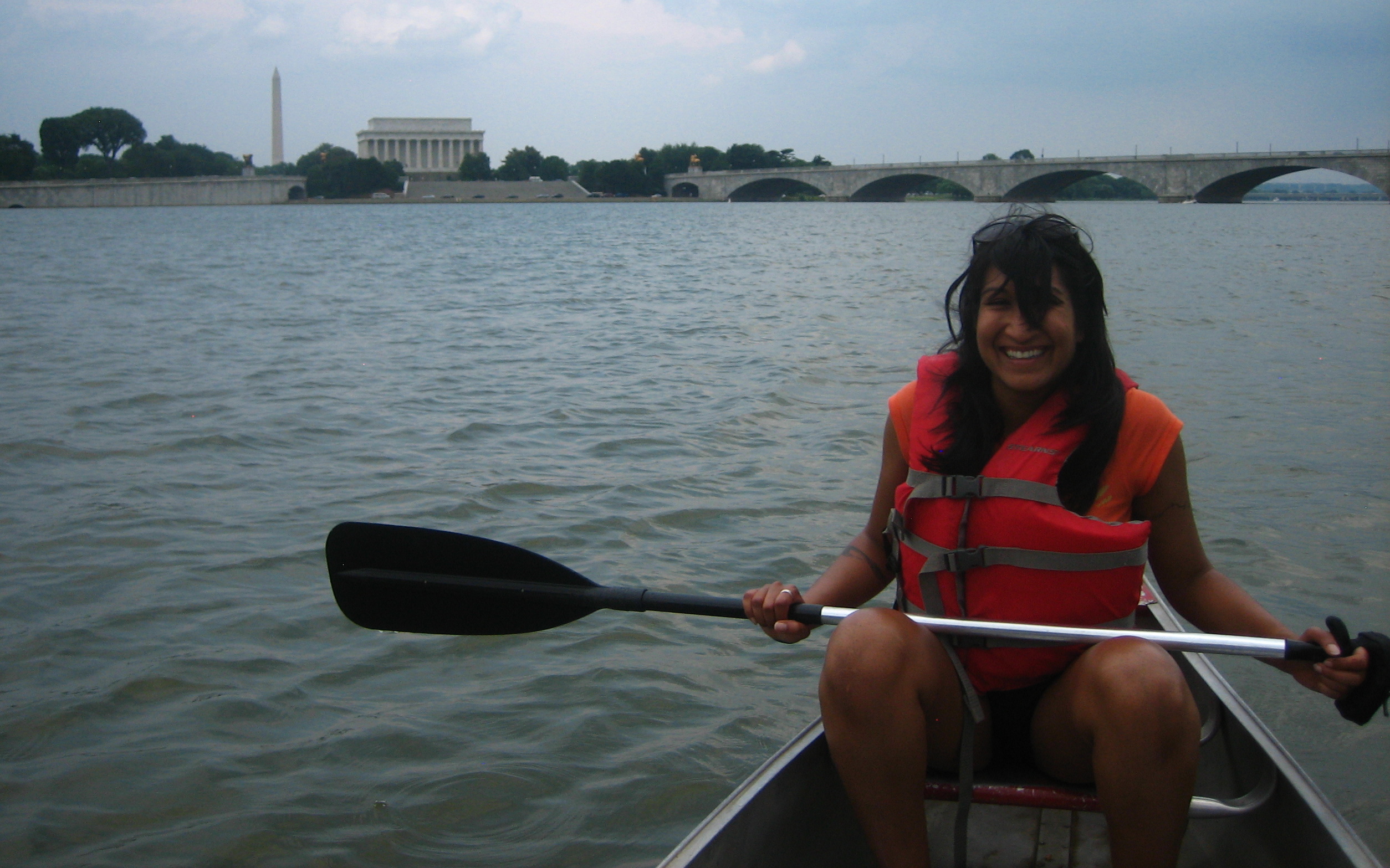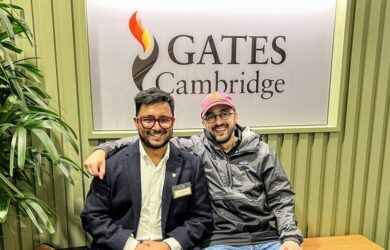
Shefali Mehta on her time at Cambridge and starting her own agriculture consultancy.
Cambridge is a wonderful place for intellectual discussions. We focus a lot on our studies, but sometimes forget that what shapes us are these unintended interactions.
Shefali Mehta
Shefali Mehta has not had a conventional career path and has straddled different academic disciplines. Now working as a freelance consultant on conservation and agriculture issues, she says Gates Cambridge and its mission to improve the lives of others marked a turning point in her career, forcing her to re-evaluate what she really wanted and to have “a grander mission”.
Shefali [2001] grew up in a small town in New England. Her parents moved to the US from India in the early 1970s as her father wanted to study computer science. From him she absorbed a love of nature. He is a great outdoors enthusiast and Shefali remembers regular visits to national parks. "From a young age my view of nature was very positive," she says. Her mother is an artist so Shefali had a strong science and arts influence at home. At school she loved learning, especially science and maths, but she was also fond of English literature. "From my early childhood I don't remember a time when I didn't have my nose in a book," she says.
She has returned recently to set up a scholarship for women studying STEM fields from her high school and says she started it in order to give back because she has benefited from several scholarships. "My entire education has been based on scholarships and they gave me opportunities. I wanted to give others that chance," she says, "and to connect back to my childhood. Women bring a different perspective and experience, but their career path is not always conventional. The scholarship aims to support and elevate them."
From a young age Shefali thought she was destined for a career in science and did several Advanced Placement courses at college. At high school she looked around at various neuroscience programmes. However, within a week of starting her undergraduate degree at New York University Shefali had switched to Economics and Computer Science. Although her course was four years long, she finished in two and a half years due to the credits she had accrued from her Advanced Placement courses at school. She chose New York because of the excitement and vibrancy of the city at the time – the late 1990s. She had always loved Economics and at school had attended her local community college to take a course in the subject. “It helped me explain the world,” she says.
Gates Cambridge
Shefali did her undergraduate thesis on microcredit programmes, evaluating what makes some successful while others fail, leaving participants in greater debt. At the time there was a lot of interest in the programmes and Shefali won a scholarship to carry out research in India which she did instead of completing her Masters in Public Administration following her degree. She relished the chance to get on-the-ground experience and learn some new languages. In fact she was in India interviewing women in a fishing village when she was found out about her interview for the Gates Cambridge scholarship. The scholarship was in its inaugural year and Shefali said it was exciting to be in the first cohort. “It was my lifelong mission to use my passion and skills to improve lives around me,” she said.
Her MPhil was in development economics – she had realised while doing her research in India that she needed to learn more about advanced techniques and modelling. She flew out of the US on 9th September 2001. When she arrived in Cambridge she was told her mother had been trying to get hold of her to tell her about the attack on the World Trade Centre. It was a traumatic start to her time at Cambridge – to be so far from home and family at such a time. Within months two close friends were killed, one in the US and the other in India. “Those three tragedies overshadowed my whole experience at Cambridge,” she says. She befriended an Anglican priest, one of the youngest woman priest in the Church, and started going to chapel which provided a different way of connecting with England.
Since it was the first year of the Gates Cambridge Trust Shefali got to meet Bill Gates Senior and heard him speak. “It was very inspirational,” she says. “It drove home that we were torch bearers, that we were the beginning of something.” Shefali went on to be the alumni editor of The Scholar magazine and an initial board member of the Gates Scholars Alumni Association after leaving Cambridge.
The experience at the university, where she was based at Selwyn College, made her realise that she needed to do a PhD. She returned to the US and taught middle school art while applying for her PhD. While she had been in India she had realised the many environmental and agricultural challenges communities faced. Working in a fishing and farming village she saw how economics and agriculture were linked. At the time the two disciplines were often treated fairly separately. Shefali felt the solution lay in the nexus between the two.
Agricultural economics
She signed up for a PhD in both Economics and Agricultural and Applied Economics at the University of Minnesota as well as a Masters in Statistics. Her background in Economics meant she had a different perspective to other Agriculture students. She puts her career switch down to her time at Cambridge. “Gates forced me to reevaluate my future and reinforced the need for a grander mission,” she says. At Cambridge she had also spent many nights talking about global issues with two close college friends – one was Tobias Billström who went on to become minister for migration and asylum policy in Sweden. Shefali had the chance to support the parliamentary campaign that led to him becoming Sweden’s youngest MP. “Those debates and experiences were an unintended consequence of Cambridge. Cambridge is a wonderful place for intellectual discussions. We focus a lot on our studies, but sometimes forget that what shapes us are these unintended interactions,” she says.
At the University of Minnesota, Shefali also held several other posts. These included working for the Federal Reserve Bank in Minneapolis, receiving a research assistantship for from the US Forest Service, teaching at St Olaf College, where she developed and taught courses in Economics and Environmental Policy, and working as a research assistant in the Minnesota Office of Higher Education where she identified critical issues of access and affordability in higher education and student finances. Shefali also founded a University of Minnesota outreach programme, Teaching SMART, which saw graduate student volunteers go into local schools to encourage under-represented students to take maths and science and to see higher education as an option for them.
Her PhD was focused on two different areas: lion conservation [the University of Minnesota has a programme in Tanzania] and optimal management strategies for invasive species in forests. When she had finished it, she knew that she did not want to stay in academia. So she got a job with McKinsey where she stayed for four years, travelling extensively and working on critical business issues such as global supply chains. She realised there that she liked helping companies, government and non profits get their mission right. She moved to agriculture business Syngenta, rising to head of data analytics in seeds research and development after four years.
In 2016 Shefali decided to leave and went hiking in Utah to reflect on what she wanted to achieve in her life. “I was a little jaded after eight years of corporate life,” she says. “I had learned a lot, but I felt I was not doing what I was meant to do. I questioned whether I could both use my knowledge and work in areas that appealed to me.”
At the same time some of her former colleagues were starting a private/public alliance for agriculture. Shefali founded Open Rivers Consulting Associates. She was not sure about taking the jump into self-employment, but it meant she could work on the kind of issues she is passionate about – invasive species, wildlife and habitat conservation and agriculture. It builds on her non-conventional career path and, in a world where many of the big challenges are multidisciplinary, it allows her to make the best use of her knowledge of different disciplines. “It was scary at first, but it brought me back to my original values,” she says. “It gives me the freedom to be my own boss, but the structure I was used to is not there. I have to do everything – there is no safety net and the risk is real. But on the other hand I get to do what I love.”

Shefali Mehta
- Alumni
- United States
- 2001 MPhil Economics
- Selwyn College












